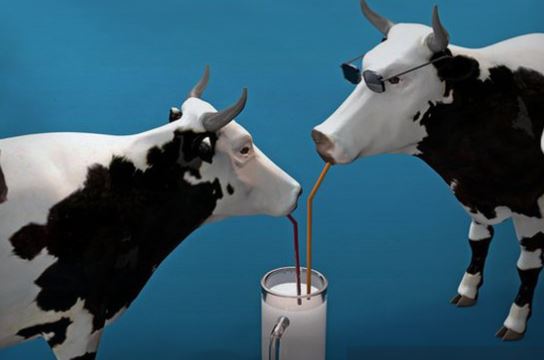Health Research Institute finds 92 unknown molecules and fungicides in synthetic milk
12/29/2023 / By Ava Grace

An Iowa-based laboratory has discovered 92 unknown compounds in an alternative dairy product produced using a “precision fermentation” process that involves the use of genetic engineering.
Health Research Institute (HRI) tested a Bored Cow product, which is described as “a milk alternative made with milk protein from fermentation instead of cows.” Using full spectrum molecular analysis technology, HRI found 92 small molecules in the product that are unknown to science, according to HRI Chief Science Officer John Fagan.
Bored Cow is a milk alternative made with milk protein from fermentation instead of cows. “They’re completely novel to our food,” Fagan said. “They are things that we haven’t consumed as human beings.”
Fagan scanned scientific literature and databases to determine whether the molecules had nutritional or other beneficial properties and found nothing. “I couldn’t even find the scientific name for the vast majority of the molecules present in the Bored Cow product. They are nutritional dark matter,” Fagan said.
The unknown molecules could be nutrients or waste products generated during the fermentation process. Of the latter, Fagan said: “You don’t necessarily want them in your food.”
From the intersection of capitalism and veganism in the 70s and 80s, these mock milks and mock meats have become more common, with dairy and meat-free alternatives in every section of the grocery store. (Related: Schools all over the U.S. are now experiencing MILK SHORTAGES.)
Bored Cow synthetic milk lacks key vitamins and minerals
The companies producing alternative animal products are claiming that their synthetic products are identical to the real thing – but they’re not. The compounds in cow’s milk like vitamins, minerals, sugars and carbohydrates are known to be safe and nutritious, Fagan said.
HRI, which tests foods for pesticide residues, has also found substantial amount of fungicides during the test. Fagan thinks it may have been added to the fermentation process to prevent the growth of microorganisms during the production of dairy protein. Fungicides are used in agriculture to kill fungi.
According to Fagan, the 92 unknown molecules “came along for the ride” with Perfect Day’s milk protein in the Bored Cow product. Perfect Day and Bored Cow both claim the milk protein is identical to the protein in cow’s milk, but HRI’s tests have found that the protein in Bored Cow’s milk was mostly from the GMO yeast and not the milk protein.
Independent food safety coalitions also tested Bored Cow synthetic milk from supermarkets across the United States. They found that it lacked riboflavin, Omega-3 fatty acids and several other key vitamins and minerals that are naturally occurring in cow’s milk.
Health advocates believe that there may be a lot to dislike about the “modern” food production system, but creating synthetically produced foods is not the solution. It is better to always consider buying organic produce from local farmers – understanding that when you pay more for food that is not factory-farmed, it’s better for every step in the food production chain and the health of your family.
Visit CleanFoodWatch.com to read more stories like this.
Watch this video to know if organic food is worth buying.
This video is from the Take Control of Your Health! channel on Brighteon.com.
More related stories:
Adding milk to coffee can help fight inflammation, suggests study.
Research indicates that organic milk has more health benefits than conventional milk.
Synthetic opioid NITAZENES could be DEADLIER than fentanyl, experts warn.
Synthetic food market projected to hit $3 trillion as fake world goes nuts for fake food.
Globalist technocrats targeting infants with lab-made breast milk.
Sources include:
Submit a correction >>
Tagged Under:
Bored Cow, clean food watch, Dangerous, farm-grown, Food Evolution, food science, food supply, fungicides, grocery, Health Research Institute, milk, products, synthetic milk, Toxic, toxic chemicals, toxins
This article may contain statements that reflect the opinion of the author
RECENT NEWS & ARTICLES
COPYRIGHT © 2017 INGREDIENTS NEWS




















